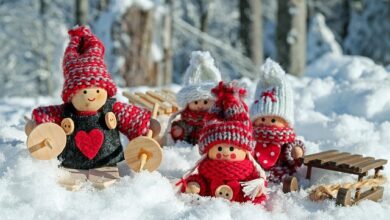Christmas in England – Karácsonyi hagyományok Angliában
Karácsonyi szokások Angilában

Christmas decorations have very early origins. Holly, ivy and mistletoe are associated with rituals going back to the Dark Ages. The custom of kissing under a sprig of mistletoe comes from an ancient pagan tradition. It was considered sacred by the British Druids. Among the Romans, it was symbol of peace, and, it was said that when enemies met under it, they discarded their arms and declared a truce. From this comes our custom of kissing under the mistletoe. England was the first country to use it during the Christmas season.

- origin: eredet
- holly: magyal
- ivy: borostyán
- mistletoe: fagyöngy
- Dark Ages: sötét középkor
- custom: szokás
- sprig: gally
- ancient: ősi
- pagan: pogány
- sacred: szent
- Druids: druidák
- enemy: ellenség
- to discard: letenni
- arms: fegyverek
- to declare
- truce: fegyverszünetet hirdetni
Among children at Christmas time pantomimes are very popular: song and dance dramatisations of well-known fairy tales which encourage audience participation. Groups of singers often sing carols on Christmas Eve to their neighbours, and children hang a stocking on the fireplace or at the foot of their bed for Santa Claus (also named Father Christmas) to fill. Presents for the family are placed under the Christmas tree.

- well-known: jól ismert
- fairy tale: mese
- to encourage: bátorítani
- audience: közönség
- participation: részvétel
- carol: örömének
- Christmas carol: karácsonyi ének
- to hang: lógatni, akasztani
- stocking: vastag harisnya
- fireplace: kandalló
- to fill: megtölteni
- Christmas tree: karácsonyfa
The old man with the sack, ‘Father Christmas’ (or ‘Santa Claus’) has become the human face of Christmas. There are pictures of the old man with long white beard, red coat, and bag of toys everywhere. Children believe that he brings them presents the night before Christmas and many children up to the age of 7 or 8 really believe this is true. It is said that he lives near the North Pole, and arrives through the sky on a sleigh pulled by reindeer. He comes into houses down the chimney at midnight and places presents for the children in socks or bags by their beds or in front of the family Christmas tree. In return, children leave some snack and milk for the hungry and thirsty Santa.

- sack: zsák
- human: emberi
- beard: szakáll
- toy: játék
- to believe: hinni
- it is said: azt mondják
- North Pole: Északi Sark
- sleigh: szán
- reindeer: rénszarvas
- chimney: kémény
- midnight: éjfél
- to place: elhelyezni
- socks: zokni
- in return: viszonzásul
Father Christmas is based on a real person, St. Nicholas, which explains his other name ‘Santa Claus’ which comes from the Dutch ‘Sinterklaas’. Nicholas was a Christian leader from Myra (in modern-day Turkey) in the 4th century AD. He was very shy, and wanted to give money to poor people without them knowing about it. It is said that one day, he climbed the roof of a house and dropped a purse of money down the chimney. It landed in the stocking which a girl had put to dry by the fire! This may explain the belief that Father Christmas comes down the chimney and places gifts in children’s stockings.

- to be based on (sg): (valamin) alapul
- to explain: megmagyarázni
- Dutch: Holland
- leader: vezető
- Turkey: Törökország
- AD: időszámításunk szerint
- shy: szerény, félénk
- to climb: mászni
- roof: tető
- to drop: ejteni
- purse: erszény
- to land: landolni, leérkezni
- to dry: száradni
- belief: hit, hiedelem
Christmas Day sees the opening of presents and many families attend Christmas services at church. Christmas dinner consists traditionally of a roast turkey, goose or chicken with stuffing and roast potatoes. This is followed by mince pies and Christmas pudding, which might contain coins or lucky charms for children. (The pudding is usually prepared weeks beforehand and is stirred by each member of the family as a wish is made.)
Another traditional feature of Christmas afternoon is the Queen’s Christmas Message to the nation, broadcast on radio and television.

- Christmas Day: Karácsony napja (dec. 25-e)
- to attend: látogatni
- Christmas service: karácsonyi szertartás
- to consist (of sg): (valamiből) állni
- roast turkey: sült pulyka
- goose: liba
- stuffing: töltelék
- roast potatoes: serpenyős burgonya
- to follow: követni
- mince pie: húsos pite
- coin: érme
- lucky charm: talizmán
- to prepare: készíteni
- to stir: megkeverni
- wish: kívánság
- feature: jellegzetesség
- nation: nemzet
- to broadcast: sugározni
The day after Christmas is known in Britain as Boxing Day, which takes its name from a former custom of giving a Christmas Box – a gift of money or food inside a box – to the deliverymen and trades people who served during the year. This tradition survives in the custom of tipping the milkman, postman, dustmen and others of good service at Christmas time.

- Boxing Day: Karácsony másnapja (dec. 26-a)
- former custom: régebbi szokás
- gift: ajándék
- deliveryman: szállító
- trades people: iparosok, kereskedők
- to survive: túlélni, fennmaradni
- to tip: borravalót adni
- milkman: tejesember (aki a tejet szállítja házhoz)
- postman: postás
- dustman: kukás (szemétszállító)
- service: szolgáltatás





